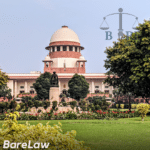
A Year in Review: The Supreme Court of India’s Major Rulings in 2023
As 2023 comes to a close, it is imperative to reflect on the pivotal role played by the Supreme Court of India in shaping the legal and societal fabric of the country. This year, the apex court has been at the forefront of major legal developments, dealing with a spectrum of significant cases that have stirred both judicial and administrative realms.
Constitution Bench Judgments:
- Fundamental Rights and Non-State Actors: The case of Kaushal Kishore v. State of Uttar Pradesh marked a landmark decision, where the Court expanded the scope of fundamental rights to include actions by non-State actors.
- Arbitration Agreements: In NN Global Mercantile Pvt Ltd v. Indo Unique Flame Ltd, the Court’s stance on unstamped arbitration agreements evolved, recognizing their enforceability unless void ab initio.
- Article 370 Abrogation: A unanimous decision upheld the abrogation of Article 370, altering the legal status of Jammu and Kashmir.
- Same-Sex Marriages: The Court’s refusal to recognize same-sex marriages in Supriyo @ Supriya Chakraborty v. Union of India highlighted the ongoing struggle for LGBTQ+ rights in India.
- DSPE Act and Retrospective Application: The ruling in CBI v. RR Kishore reaffirmed the Court’s commitment to equality before the law, irrespective of an individual’s governmental position.
- Demonetisation Verdict: In Vivek Narayan Sharma v. Union of India, the Court upheld the controversial demonetisation move, despite dissent from Justice Nagarathna.
- Passive Euthanasia Norms: The modification in the 2018 judgment regarding passive euthanasia emphasized the Court’s progressive stance on personal liberty and dignity.
- Irretrievable Breakdown of Marriages: The decision in Shilpa Sailesh v. Varun Sreenivasan empowered the Court to dissolve marriages under irretrievable breakdown, a significant move in matrimonial law.
- Group of Companies Doctrine in Arbitration: This doctrine was recognized, expanding the scope of arbitration to include non-signatory parties under certain conditions.
- Election Commissioner Selections: The Court initially included the Chief Justice of India in the selection panel for Election Commissioners, a decision later altered by parliamentary legislation.
Political Cases:
- Maharashtra Political Crisis: The Court’s intervention in Subhash Desai v. Principal Secretary brought significant political changes in Maharashtra.
- Delhi Government vs. Lieutenant Governor: The ruling in favor of the Delhi government in controlling services highlighted the delicate balance of power in the Union Territory.
- Governors vs. State Governments: Multiple cases throughout the year brought into focus the tension between State Governments and their respective Governors.
- Manipur Violence Crisis: The Court’s proactive approach in forming a committee to address the violence in Manipur demonstrated its responsiveness to critical social issues.
- Controversy over Justice Victoria Gowri’s Elevation: This case underscored the complexities involved in judicial appointments.
Relief for Political Leaders and Activists:
- Bail for Teesta Setalvad: This decision was significant in the context of human rights and political activism in India.
- Rahul Gandhi’s Stay on Conviction: The Supreme Court’s intervention in Rahul Gandhi v. Purnesh Ishwarbhai Modi indicated the Court’s recognition of the broader implications of political legal battles.
- Pawan Khera’s FIR Clubbing: This ruling in Pawan Khera v. State of Assam highlighted the Court’s stance on political speech and defamation.
- Bail for Bhima Koregaon Accused: The decision to grant bail to Vernon Gonsalves and Arun Ferreira underlined the Court’s approach towards UAPA cases.
- Refusal of Bail to Manish Sisodia: The denial of bail in Manish Sisodia v. CBI showed the Court’s strict stance on allegations of corruption.
Other Important Rulings:
- Right to Vote: The Court’s observations in Bhim Rao Baswanth Rao Patil v. K Madan Mohan Rao emphasized the importance of transparency in the electoral process.
- B.Ed Graduates and Primary School Teaching: The ruling in Devesh Sharma v. Union of India marked a significant educational reform.
- POSH Act Implementation: The Court’s criticism in Aureliano Fernandes v. State of Goa showcased its commitment to workplace safety and women’s





